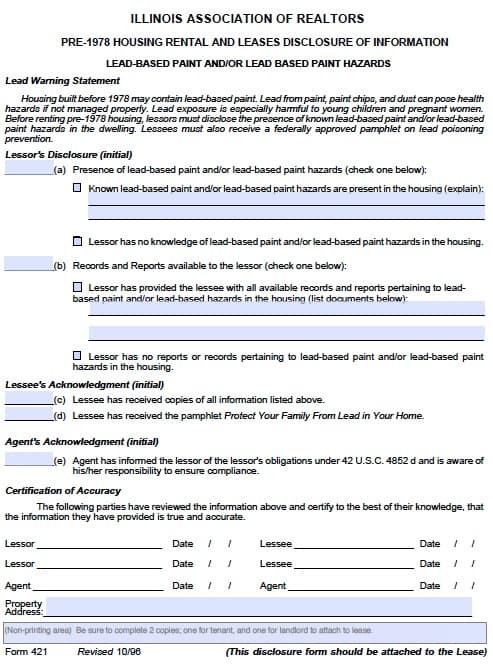A. The Department of Education shall develop and make publicly available on its website policies to ensure state and local compliance with the federal Family Educational Rights and Privacy Act (20 U.S.C. § 1232g) and state law applicable to students' personally identifiable information, including policies for (i) access to students' personally identifiable information and (ii) the approval of requests for student data from public and private entities and individuals for the purpose of research.
Paid Assessment Letter & 22.1 Disclosure Form When selling your property, a Paid Assessment letter (PAL) and 22.1 Disclosure form from the Mariners Cove Community Association will be requested. These requests are typically made by the Seller’s Attorney’s office. The PAL indicates that all Assessments and Fees for the property have been paid.
- S.22(1) Personal. To the appropriate disclosure clerk local government officer responsible for corporate administration, secretary treasurer, or Clerk of the.
- 22.1 Disclosure contains information about the Association such as; Assessment fees, liens against the property and/or the association, Capital expenditures, status of the Reserve, pending litigation and insurance. The following is required to obtain these documents:. Property Address. Requestor’s Name(S).
- PDF rewriter permits you to create alterations to your IL Habitat Condominium 758.1/22.1 Disclosure 0 Form through the world wide web related device, customize it as outlined by your preferences, indication the idea in electronic format and also disperse in another way.
- Seller and Buyer have read this Mold Disclosure and by their signatures hereon acknowledge receipt of a copy thereof. PROFESSIONAL ADVICE. Seller and Buyer execute this Disclosure with the understanding that they should consult with a professional of their choice regarding any questions or concerns before its execution.
B. In cases in which electronic records containing personally identifiable information are reasonably believed by the Department of Education or a local school division to have been disclosed in violation of the Family Educational Rights and Privacy Act (20 U.S.C. § 1232g) or other federal or state law applicable to such information, the Department or local school division shall notify, as soon as practicable, the parent of any student affected by such disclosure, except as otherwise provided in § 32.1-127.1:05 or 18.2-186.6. Such notification shall include the (i) date, estimated date, or date range of the disclosure; (ii) type of information that was or is reasonably believed to have been disclosed; and (iii) remedial measures taken or planned in response to the disclosure.
2015, c. 139.

We do everything big in Chicago. This town is called the “City of Broad Shoulders” for a reason. Our sandwiches are piled high. Our baseball teams are the stuff of tall tales. Our rappers have the biggest albums. And our town is full of the some of the biggest, most iconic skyscrapers in the world.
In fact, did you know that Chicago is home to more than 120 buildings clocking in at 150 stories or taller?
We’re a city that has always built up, up, up, never stopping until we’ve reached the sky. And as a result, Chicago has always been a city where condos and apartments have been a big deal – complete with their own sets of rules, regulations, and legal requirements to understand.

If you’re interested in buying or selling a condo in Chicago, or elsewhere in Illinois, there’s one particular thing that often comes up, which people from outside of the state may not understand. It’s a number, and it’s an important concept to grasp before you start honing in on your next condo: 22.1.
What Is a 22.1 Disclosure?
Broadly speaking, “22.1” refers to the State of Illinois’ statute on disclosures for condominiums being sold by any owner other than the developer. You can find a link to the relevant statute here.
In conversation, you’ll generally hear 22.1 in reference to a 22.1 disclosure. Put simply, this is the condominium documents and information that a condo association or management company must present to a prospective purchaser and their team upon request.
In order for a 22.1 disclosure to be compliant with the law, it must include a number of relevant documents, information, and paperwork, including:
- Condominium association documents, including declaration, bylaws, other rules and regulations
- Contact information for relevant parties on the condo owner’s association
- Liens, unpaid assessments, and other charges due within the building
- Projected budget and capital expenditures, as well as information on the previous year’s finances
- Any pending lawsuits or other legal cases involving the condo association/building
- Information on budget, including funds reserved or earmarked for reserves or specific projects
- Information on the building’s insurance
- Disclosures and information pertaining to changes to the specified unit
More often than not, it is typically the seller who notifies the condo board or association about a prospective buyer, so that the condo can begin preparing the relevant paperwork. Nevertheless, once a buyer and his or her representatives put in a request for 22.1 disclosure information, it must be furnished within 30 days.
In many cases, this process has largely migrated online. As the Chicago Tribune recently put it:
“Some management companies handle document requests in-house, but many have turned to third-party providers. Nearly everyone has moved the process online. Typically, sellers, real estate agents, attorneys and lenders are referred to a website to choose the documents they want.”
The Tribune also makes another important point, noting that associations may charge “a reasonable fee for out-of-pocket costs for providing the information,” with the amount paid for documents and processing often rolling into closing costs.
Understanding What Goes Into Buying or Selling a Condo
When it comes to buying or selling a condo property in Chicago, there’s a lot to understand – and disclosures and documents are just the tip of the iceberg.

22.1 Disclosure Pdf Accounting
In Chicago, the homebuying and rental process is unique, with countless rules and regulations worth understanding in depth. These include lease and rental agreement laws, security deposit laws, commercial development laws, and many more.
22.1 Disclosure Pdf
Bottom line? There is a lot more to real estate law in Chicago than you might think, and it’s important to have a team by your side who can help you understand and comply with the law.

The Gunderson Law Firm possesses that expertise and insight, reinforced by years of experience and long-term connections throughout Chicago’s real estate, finance, and insurance industries. We can assist with a range of real estate legal services, including:
- Residential Real Estate
- Commercial Real Estate
- Purchases and Sales
- 1031 Tax-Free Exchanges
- Mortgage Conveyancing & Advice
- Real Estate Litigation
- Title Insurance
- Title Examinations & Disputes
- Asset Protection / Trusts
- Estate Planning / WillsReverse Mortgages
- Property Development
- Condominium Law
- Foreclosures
22.1 Disclosure Pdf Examples
Have any questions? Ready to find out more? The attorneys and staff of The Gunderson Law Firm specialize in helping individuals and businesses in Illinois with real estate transactions insightfully, promptly, and professionally. Don’t hesitate to drop us line today to get the conversation started.
